Ethical Implications in Human Research: Australian National Statement
VerifiedAdded on 2023/06/04
|7
|1594
|271
Report
AI Summary
This report delves into the ethical implications of human research, particularly within the context of a study involving nursing colleagues and dementia patients. It begins with an introduction emphasizing the importance of ethical considerations in nursing research. The core of the report addresses two key questions based on the Australian National Statement of Ethical Conduct. The first question identifies the key values and principles, including respect for human beings, integrity and merit of research, justice, and beneficence. The second question focuses on the ethical considerations relevant to research participants, such as seeking informed consent, maintaining integrity, ensuring justice, and maximizing benefits while minimizing risks. For each consideration, the report outlines specific mitigation strategies to uphold ethical obligations, such as obtaining consent, ensuring fairness in participant selection, and carefully assessing risks and benefits. The report highlights the importance of ethical conduct in human research, providing a comprehensive overview of the values, principles, and practical strategies necessary to protect the rights and well-being of research participants.
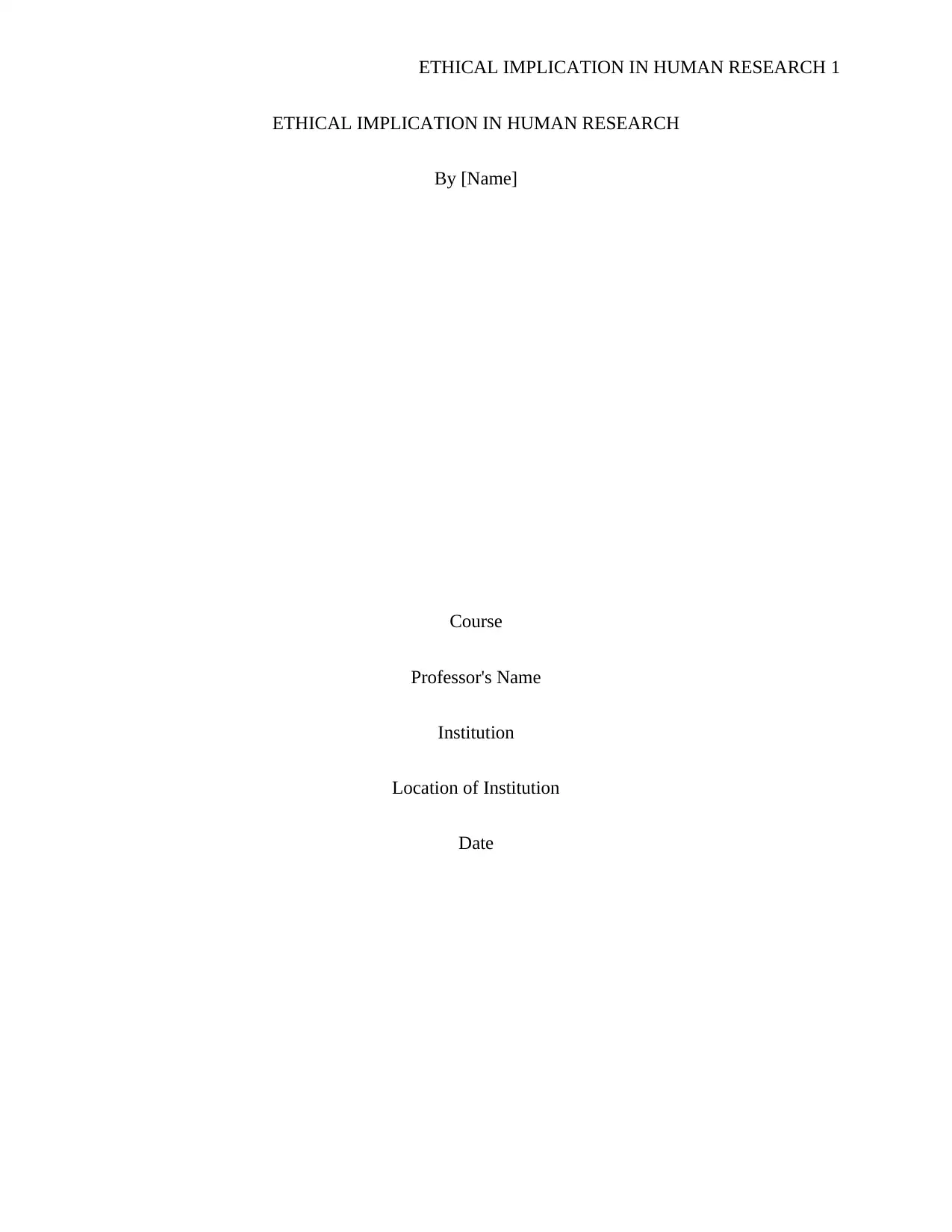
ETHICAL IMPLICATION IN HUMAN RESEARCH 1
ETHICAL IMPLICATION IN HUMAN RESEARCH
By [Name]
Course
Professor's Name
Institution
Location of Institution
Date
ETHICAL IMPLICATION IN HUMAN RESEARCH
By [Name]
Course
Professor's Name
Institution
Location of Institution
Date
Paraphrase This Document
Need a fresh take? Get an instant paraphrase of this document with our AI Paraphraser
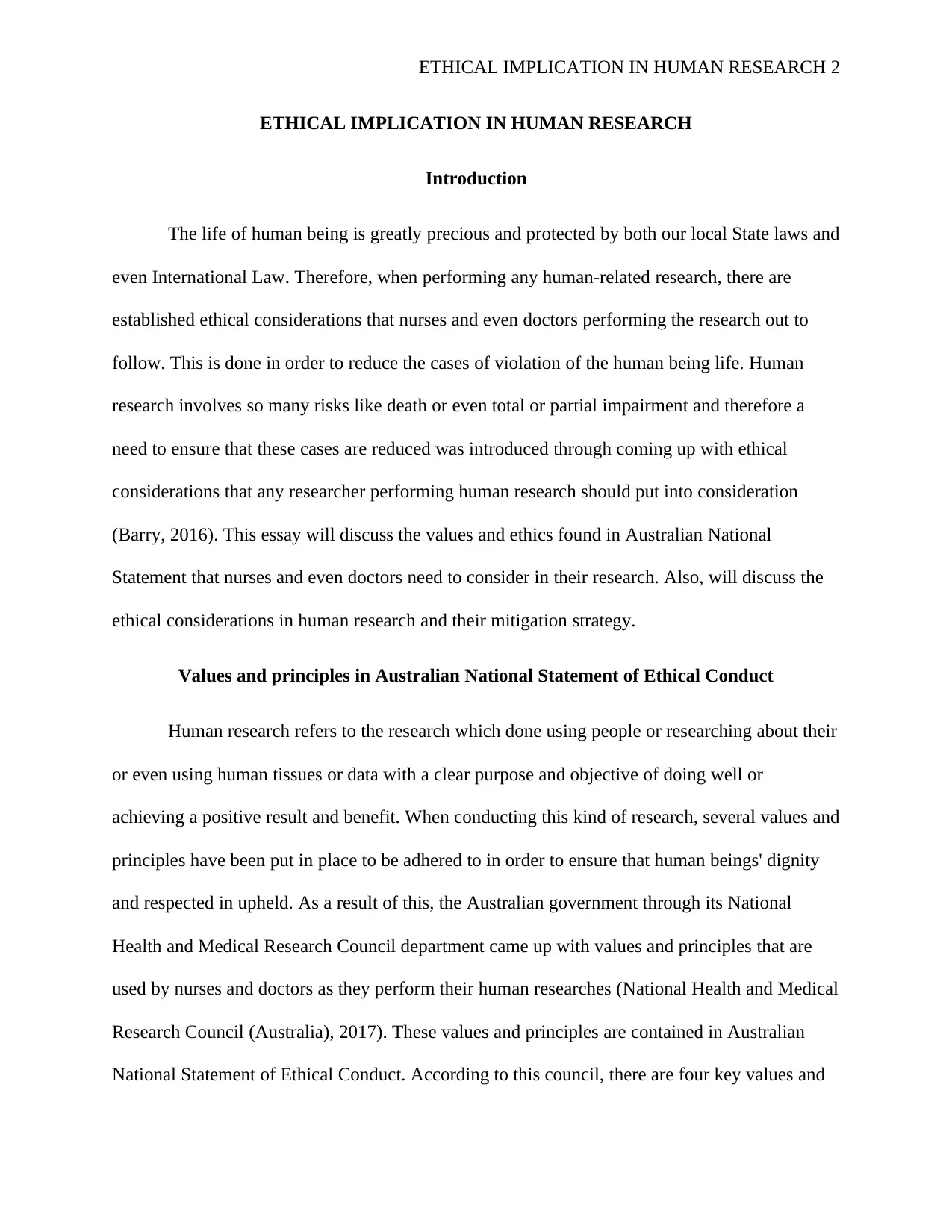
ETHICAL IMPLICATION IN HUMAN RESEARCH 2
ETHICAL IMPLICATION IN HUMAN RESEARCH
Introduction
The life of human being is greatly precious and protected by both our local State laws and
even International Law. Therefore, when performing any human-related research, there are
established ethical considerations that nurses and even doctors performing the research out to
follow. This is done in order to reduce the cases of violation of the human being life. Human
research involves so many risks like death or even total or partial impairment and therefore a
need to ensure that these cases are reduced was introduced through coming up with ethical
considerations that any researcher performing human research should put into consideration
(Barry, 2016). This essay will discuss the values and ethics found in Australian National
Statement that nurses and even doctors need to consider in their research. Also, will discuss the
ethical considerations in human research and their mitigation strategy.
Values and principles in Australian National Statement of Ethical Conduct
Human research refers to the research which done using people or researching about their
or even using human tissues or data with a clear purpose and objective of doing well or
achieving a positive result and benefit. When conducting this kind of research, several values and
principles have been put in place to be adhered to in order to ensure that human beings' dignity
and respected in upheld. As a result of this, the Australian government through its National
Health and Medical Research Council department came up with values and principles that are
used by nurses and doctors as they perform their human researches (National Health and Medical
Research Council (Australia), 2017). These values and principles are contained in Australian
National Statement of Ethical Conduct. According to this council, there are four key values and
ETHICAL IMPLICATION IN HUMAN RESEARCH
Introduction
The life of human being is greatly precious and protected by both our local State laws and
even International Law. Therefore, when performing any human-related research, there are
established ethical considerations that nurses and even doctors performing the research out to
follow. This is done in order to reduce the cases of violation of the human being life. Human
research involves so many risks like death or even total or partial impairment and therefore a
need to ensure that these cases are reduced was introduced through coming up with ethical
considerations that any researcher performing human research should put into consideration
(Barry, 2016). This essay will discuss the values and ethics found in Australian National
Statement that nurses and even doctors need to consider in their research. Also, will discuss the
ethical considerations in human research and their mitigation strategy.
Values and principles in Australian National Statement of Ethical Conduct
Human research refers to the research which done using people or researching about their
or even using human tissues or data with a clear purpose and objective of doing well or
achieving a positive result and benefit. When conducting this kind of research, several values and
principles have been put in place to be adhered to in order to ensure that human beings' dignity
and respected in upheld. As a result of this, the Australian government through its National
Health and Medical Research Council department came up with values and principles that are
used by nurses and doctors as they perform their human researches (National Health and Medical
Research Council (Australia), 2017). These values and principles are contained in Australian
National Statement of Ethical Conduct. According to this council, there are four key values and
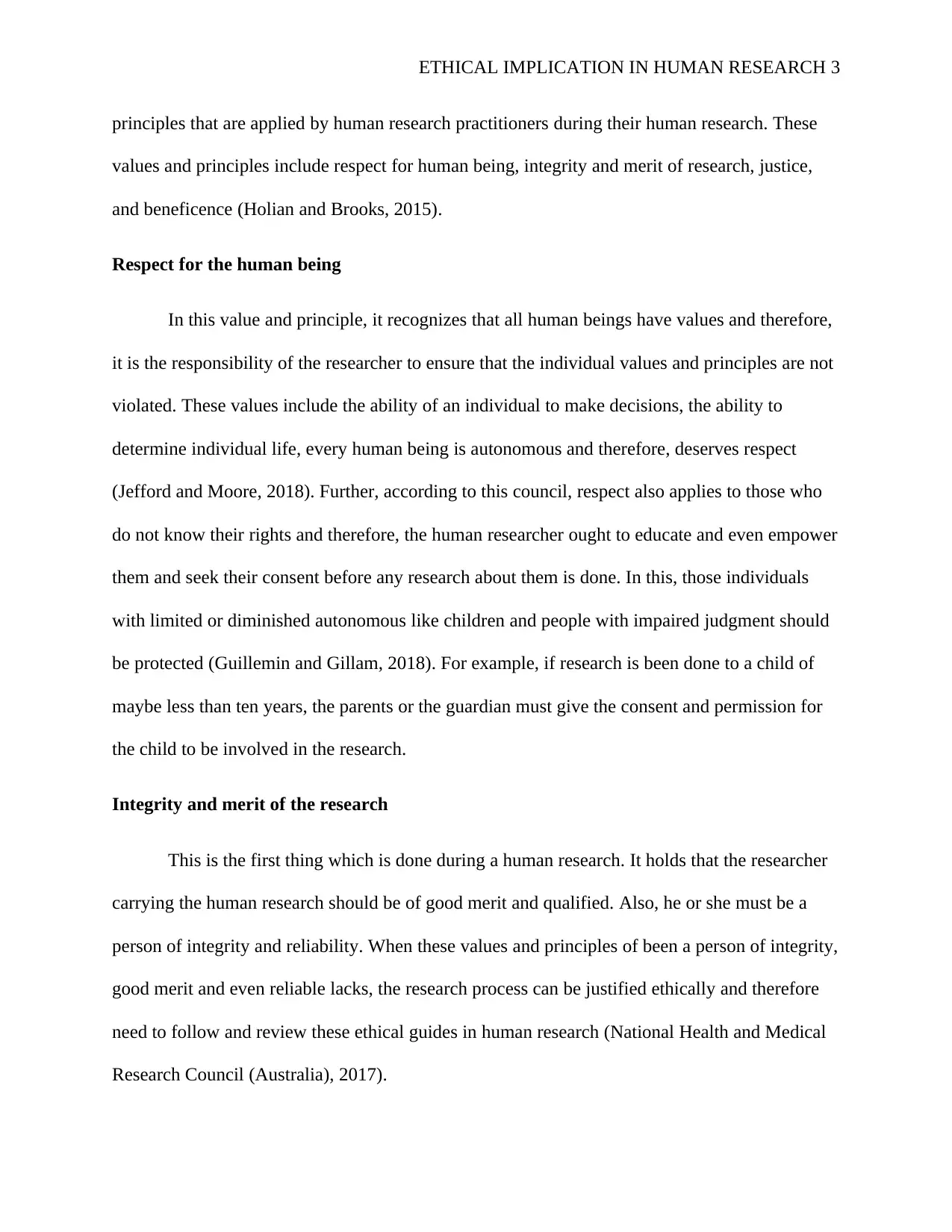
ETHICAL IMPLICATION IN HUMAN RESEARCH 3
principles that are applied by human research practitioners during their human research. These
values and principles include respect for human being, integrity and merit of research, justice,
and beneficence (Holian and Brooks, 2015).
Respect for the human being
In this value and principle, it recognizes that all human beings have values and therefore,
it is the responsibility of the researcher to ensure that the individual values and principles are not
violated. These values include the ability of an individual to make decisions, the ability to
determine individual life, every human being is autonomous and therefore, deserves respect
(Jefford and Moore, 2018). Further, according to this council, respect also applies to those who
do not know their rights and therefore, the human researcher ought to educate and even empower
them and seek their consent before any research about them is done. In this, those individuals
with limited or diminished autonomous like children and people with impaired judgment should
be protected (Guillemin and Gillam, 2018). For example, if research is been done to a child of
maybe less than ten years, the parents or the guardian must give the consent and permission for
the child to be involved in the research.
Integrity and merit of the research
This is the first thing which is done during a human research. It holds that the researcher
carrying the human research should be of good merit and qualified. Also, he or she must be a
person of integrity and reliability. When these values and principles of been a person of integrity,
good merit and even reliable lacks, the research process can be justified ethically and therefore
need to follow and review these ethical guides in human research (National Health and Medical
Research Council (Australia), 2017).
principles that are applied by human research practitioners during their human research. These
values and principles include respect for human being, integrity and merit of research, justice,
and beneficence (Holian and Brooks, 2015).
Respect for the human being
In this value and principle, it recognizes that all human beings have values and therefore,
it is the responsibility of the researcher to ensure that the individual values and principles are not
violated. These values include the ability of an individual to make decisions, the ability to
determine individual life, every human being is autonomous and therefore, deserves respect
(Jefford and Moore, 2018). Further, according to this council, respect also applies to those who
do not know their rights and therefore, the human researcher ought to educate and even empower
them and seek their consent before any research about them is done. In this, those individuals
with limited or diminished autonomous like children and people with impaired judgment should
be protected (Guillemin and Gillam, 2018). For example, if research is been done to a child of
maybe less than ten years, the parents or the guardian must give the consent and permission for
the child to be involved in the research.
Integrity and merit of the research
This is the first thing which is done during a human research. It holds that the researcher
carrying the human research should be of good merit and qualified. Also, he or she must be a
person of integrity and reliability. When these values and principles of been a person of integrity,
good merit and even reliable lacks, the research process can be justified ethically and therefore
need to follow and review these ethical guides in human research (National Health and Medical
Research Council (Australia), 2017).
⊘ This is a preview!⊘
Do you want full access?
Subscribe today to unlock all pages.

Trusted by 1+ million students worldwide
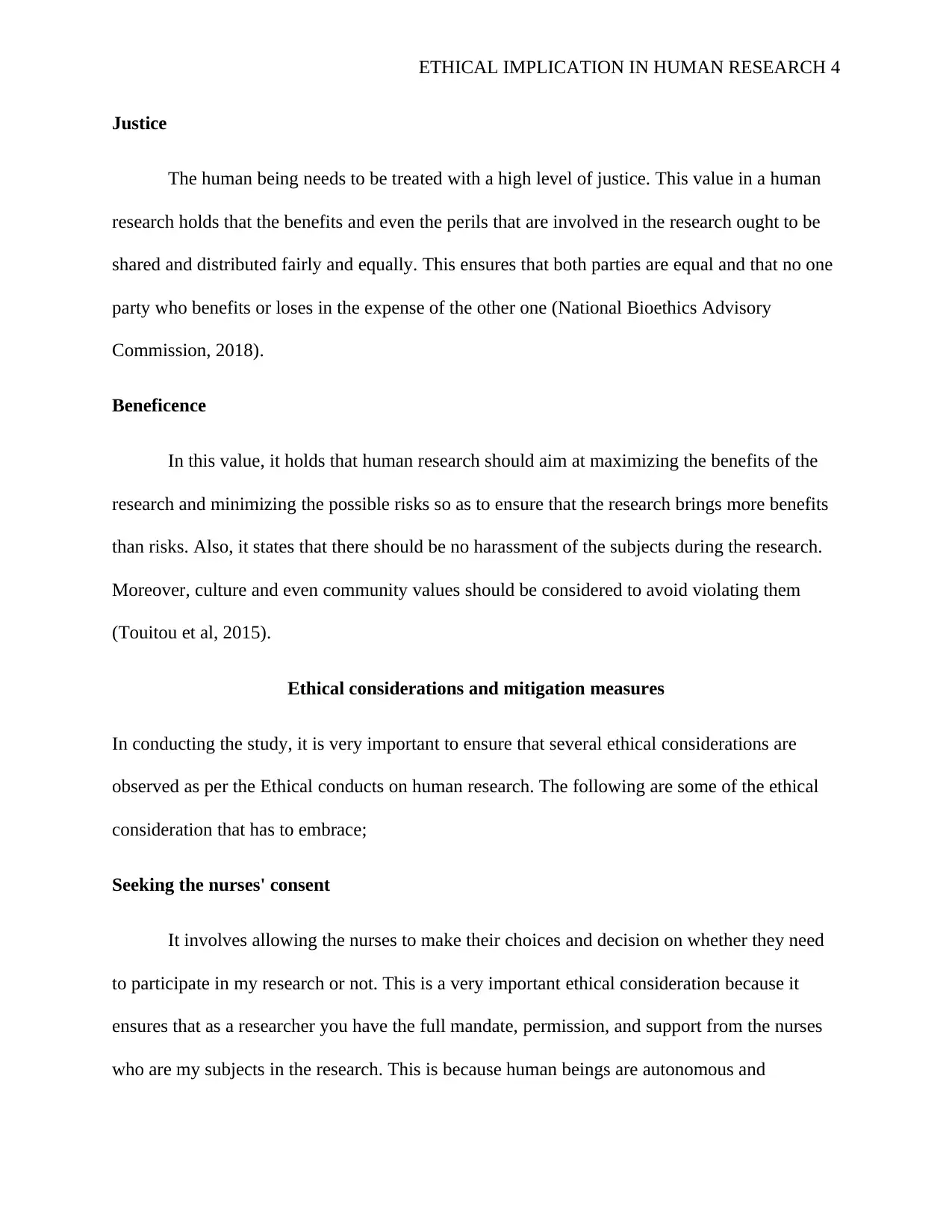
ETHICAL IMPLICATION IN HUMAN RESEARCH 4
Justice
The human being needs to be treated with a high level of justice. This value in a human
research holds that the benefits and even the perils that are involved in the research ought to be
shared and distributed fairly and equally. This ensures that both parties are equal and that no one
party who benefits or loses in the expense of the other one (National Bioethics Advisory
Commission, 2018).
Beneficence
In this value, it holds that human research should aim at maximizing the benefits of the
research and minimizing the possible risks so as to ensure that the research brings more benefits
than risks. Also, it states that there should be no harassment of the subjects during the research.
Moreover, culture and even community values should be considered to avoid violating them
(Touitou et al, 2015).
Ethical considerations and mitigation measures
In conducting the study, it is very important to ensure that several ethical considerations are
observed as per the Ethical conducts on human research. The following are some of the ethical
consideration that has to embrace;
Seeking the nurses' consent
It involves allowing the nurses to make their choices and decision on whether they need
to participate in my research or not. This is a very important ethical consideration because it
ensures that as a researcher you have the full mandate, permission, and support from the nurses
who are my subjects in the research. This is because human beings are autonomous and
Justice
The human being needs to be treated with a high level of justice. This value in a human
research holds that the benefits and even the perils that are involved in the research ought to be
shared and distributed fairly and equally. This ensures that both parties are equal and that no one
party who benefits or loses in the expense of the other one (National Bioethics Advisory
Commission, 2018).
Beneficence
In this value, it holds that human research should aim at maximizing the benefits of the
research and minimizing the possible risks so as to ensure that the research brings more benefits
than risks. Also, it states that there should be no harassment of the subjects during the research.
Moreover, culture and even community values should be considered to avoid violating them
(Touitou et al, 2015).
Ethical considerations and mitigation measures
In conducting the study, it is very important to ensure that several ethical considerations are
observed as per the Ethical conducts on human research. The following are some of the ethical
consideration that has to embrace;
Seeking the nurses' consent
It involves allowing the nurses to make their choices and decision on whether they need
to participate in my research or not. This is a very important ethical consideration because it
ensures that as a researcher you have the full mandate, permission, and support from the nurses
who are my subjects in the research. This is because human beings are autonomous and
Paraphrase This Document
Need a fresh take? Get an instant paraphrase of this document with our AI Paraphraser
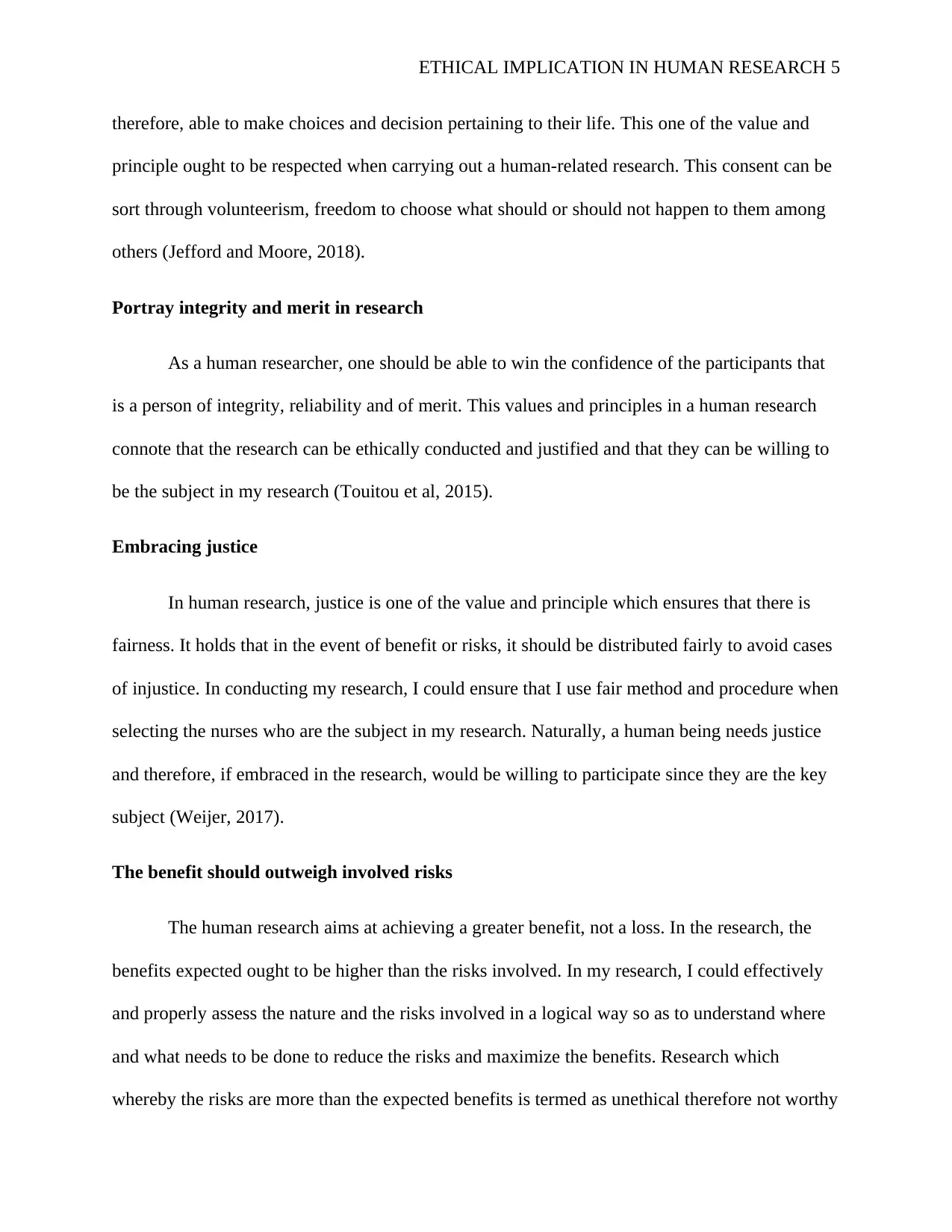
ETHICAL IMPLICATION IN HUMAN RESEARCH 5
therefore, able to make choices and decision pertaining to their life. This one of the value and
principle ought to be respected when carrying out a human-related research. This consent can be
sort through volunteerism, freedom to choose what should or should not happen to them among
others (Jefford and Moore, 2018).
Portray integrity and merit in research
As a human researcher, one should be able to win the confidence of the participants that
is a person of integrity, reliability and of merit. This values and principles in a human research
connote that the research can be ethically conducted and justified and that they can be willing to
be the subject in my research (Touitou et al, 2015).
Embracing justice
In human research, justice is one of the value and principle which ensures that there is
fairness. It holds that in the event of benefit or risks, it should be distributed fairly to avoid cases
of injustice. In conducting my research, I could ensure that I use fair method and procedure when
selecting the nurses who are the subject in my research. Naturally, a human being needs justice
and therefore, if embraced in the research, would be willing to participate since they are the key
subject (Weijer, 2017).
The benefit should outweigh involved risks
The human research aims at achieving a greater benefit, not a loss. In the research, the
benefits expected ought to be higher than the risks involved. In my research, I could effectively
and properly assess the nature and the risks involved in a logical way so as to understand where
and what needs to be done to reduce the risks and maximize the benefits. Research which
whereby the risks are more than the expected benefits is termed as unethical therefore not worthy
therefore, able to make choices and decision pertaining to their life. This one of the value and
principle ought to be respected when carrying out a human-related research. This consent can be
sort through volunteerism, freedom to choose what should or should not happen to them among
others (Jefford and Moore, 2018).
Portray integrity and merit in research
As a human researcher, one should be able to win the confidence of the participants that
is a person of integrity, reliability and of merit. This values and principles in a human research
connote that the research can be ethically conducted and justified and that they can be willing to
be the subject in my research (Touitou et al, 2015).
Embracing justice
In human research, justice is one of the value and principle which ensures that there is
fairness. It holds that in the event of benefit or risks, it should be distributed fairly to avoid cases
of injustice. In conducting my research, I could ensure that I use fair method and procedure when
selecting the nurses who are the subject in my research. Naturally, a human being needs justice
and therefore, if embraced in the research, would be willing to participate since they are the key
subject (Weijer, 2017).
The benefit should outweigh involved risks
The human research aims at achieving a greater benefit, not a loss. In the research, the
benefits expected ought to be higher than the risks involved. In my research, I could effectively
and properly assess the nature and the risks involved in a logical way so as to understand where
and what needs to be done to reduce the risks and maximize the benefits. Research which
whereby the risks are more than the expected benefits is termed as unethical therefore not worthy

ETHICAL IMPLICATION IN HUMAN RESEARCH 6
to be done because it is causing more harm than the existing one. The aim of a result is to
improve and even benefit a given area and therefore, the benefits of the research ought to
outweigh the risks involved (Touitou et al, 2015).
to be done because it is causing more harm than the existing one. The aim of a result is to
improve and even benefit a given area and therefore, the benefits of the research ought to
outweigh the risks involved (Touitou et al, 2015).
⊘ This is a preview!⊘
Do you want full access?
Subscribe today to unlock all pages.

Trusted by 1+ million students worldwide
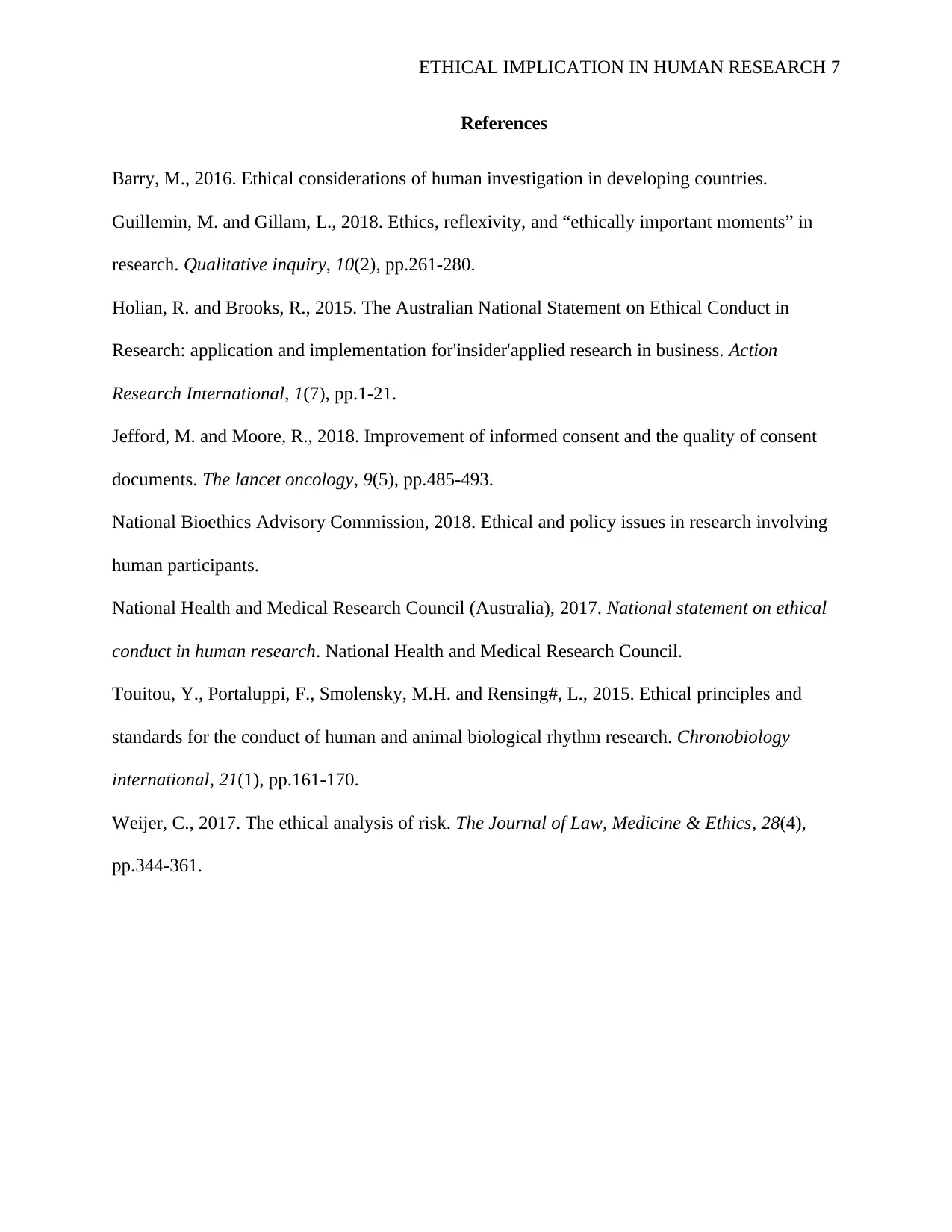
ETHICAL IMPLICATION IN HUMAN RESEARCH 7
References
Barry, M., 2016. Ethical considerations of human investigation in developing countries.
Guillemin, M. and Gillam, L., 2018. Ethics, reflexivity, and “ethically important moments” in
research. Qualitative inquiry, 10(2), pp.261-280.
Holian, R. and Brooks, R., 2015. The Australian National Statement on Ethical Conduct in
Research: application and implementation for'insider'applied research in business. Action
Research International, 1(7), pp.1-21.
Jefford, M. and Moore, R., 2018. Improvement of informed consent and the quality of consent
documents. The lancet oncology, 9(5), pp.485-493.
National Bioethics Advisory Commission, 2018. Ethical and policy issues in research involving
human participants.
National Health and Medical Research Council (Australia), 2017. National statement on ethical
conduct in human research. National Health and Medical Research Council.
Touitou, Y., Portaluppi, F., Smolensky, M.H. and Rensing#, L., 2015. Ethical principles and
standards for the conduct of human and animal biological rhythm research. Chronobiology
international, 21(1), pp.161-170.
Weijer, C., 2017. The ethical analysis of risk. The Journal of Law, Medicine & Ethics, 28(4),
pp.344-361.
References
Barry, M., 2016. Ethical considerations of human investigation in developing countries.
Guillemin, M. and Gillam, L., 2018. Ethics, reflexivity, and “ethically important moments” in
research. Qualitative inquiry, 10(2), pp.261-280.
Holian, R. and Brooks, R., 2015. The Australian National Statement on Ethical Conduct in
Research: application and implementation for'insider'applied research in business. Action
Research International, 1(7), pp.1-21.
Jefford, M. and Moore, R., 2018. Improvement of informed consent and the quality of consent
documents. The lancet oncology, 9(5), pp.485-493.
National Bioethics Advisory Commission, 2018. Ethical and policy issues in research involving
human participants.
National Health and Medical Research Council (Australia), 2017. National statement on ethical
conduct in human research. National Health and Medical Research Council.
Touitou, Y., Portaluppi, F., Smolensky, M.H. and Rensing#, L., 2015. Ethical principles and
standards for the conduct of human and animal biological rhythm research. Chronobiology
international, 21(1), pp.161-170.
Weijer, C., 2017. The ethical analysis of risk. The Journal of Law, Medicine & Ethics, 28(4),
pp.344-361.
1 out of 7
Related Documents
Your All-in-One AI-Powered Toolkit for Academic Success.
+13062052269
info@desklib.com
Available 24*7 on WhatsApp / Email
![[object Object]](/_next/static/media/star-bottom.7253800d.svg)
Unlock your academic potential
Copyright © 2020–2026 A2Z Services. All Rights Reserved. Developed and managed by ZUCOL.





